On Friday afternoon, the Arizona Coyotes finished off the Nashville Predators in the Stanley Cup qualifiers, winning Game 4 in overtime on a Brad Richardson goal that clinched the franchise’s first playoff appearance since the 2011-12 season.
The eight-year drought is over. The ‘Yotes are officially back in the postseason.
Their reward for getting over the hump and beating the Predators? A matchup against the Colorado Avalanche, who were on pace for 108 points in the regular season and finished as the West’s second-best team. It’ll all get started on Wednesday afternoon, so, without further ado, let’s take a look back at the season series between these teams, as well as where the clubs stand at each position group:
Season Series Recap
During the 2019-20 season, the ‘Yotes finished 11th in the Western Conference and fifth in the Pacific Division with a 33-29-8 record, which was good for 74 points. They also ended the year with a plus-eight goal differential, with 195 goals for and 187 against. In the playoffs, they’re 3-1 with 14 goals for and 11 goals against.
When it comes to the Avs, they essentially were locked in a tie with the St. Louis Blues for the best record in both the Western Conference and the Central Division when play was paused on March 12, at which time Colorado trailed the Blues by two points but had a game in hand. They ultimately wrapped up the season with 92 points (42-20-8) and a plus-46 goal differential (237 for, 191 against). In round-robin play, they went 2-0-1 with nine goals for and five against.
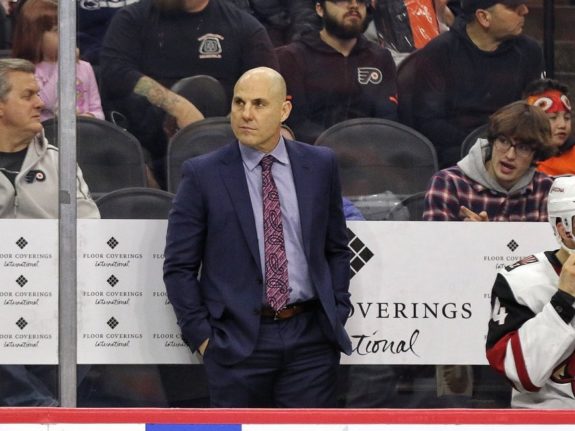
Over the course of the 2019-20 regular season, these clubs met twice, with the home team winning on both occasions. In the first meeting way back on Oct. 12, the Avalanche picked up an overtime win in both teams’ fourth game of the season. Antti Raanta made 29 saves on 32 shots in that one, and the Coyotes forced overtime after trailing 2-0 in the third period on goals from Michael Grabner and Nick Schmaltz. They were unable to complete the comeback, though, as Andre Burakovsky scored in overtime to help Colorado stay undefeated at 4-0-0.
Three weeks later, the two teams were at it again at Gila River Arena in Glendale on Nov. 2. Darcy Kuemper started that one and was the story of the game, as he stopped all 33 shots he faced to deal Colorado the first of just two shutout losses they’d suffer all season. Christian Dvorak, Conor Garland, and Phil Kessel scored that night to provide the offense in a 3-0 Arizona victory.
The third and final meeting between these teams, scheduled for March 31 at the Pepsi Center in Denver, was canceled.
Forwards
One doesn’t even have to look at the statsheet to know that Colorado will have a huge advantage at the offensive end of the ice in this series. Led by the top line of captain Gabriel Landeskog, Nathan MacKinnon, and Mikko Rantanen, the Avs were one of the league’s most dangerous offensive teams this season, finishing fourth in the NHL in goals per game at 3.37.

Rantanen and Landeskog both missed time due to injury but still had solid regular seasons, posting 0.98 and 0.88 points per game (P/GP), respectively. MacKinnon played 69 of 70 games and collected 93 points in the process to finish fifth in the league in scoring. The Nova Scotian also posted his third consecutive 90-point effort in 2019-20, joining Connor McDavid as the only other NHLers to do so.
Behind the top line, the Avalanche boast Andre Burakovsky, Nazem Kadri, J.T. Compher, Joonas Donskoi, and others further down the lineup. Because of the injuries to Landeskog and Rantanen, Burakovsky actually finished as Colorado’s second-highest scoring forward, with 45 points. Kadri also had a solid season in his first year in Colorado, collecting 36 points in 51 games.
The Coyotes are at a clear disadvantage here, but they managed to score 14 goals (3.50 per game) in their qualifying-round series after averaging just 2.71 goals per game in the regular season. Midseason acquisition Taylor Hall led the charge for Arizona, posting four points and leading the forward group with 19:38 of ice-time per game. The ‘Yotes brought in Hall because of his difference-making abilities and, so far, he hasn’t disappointed.
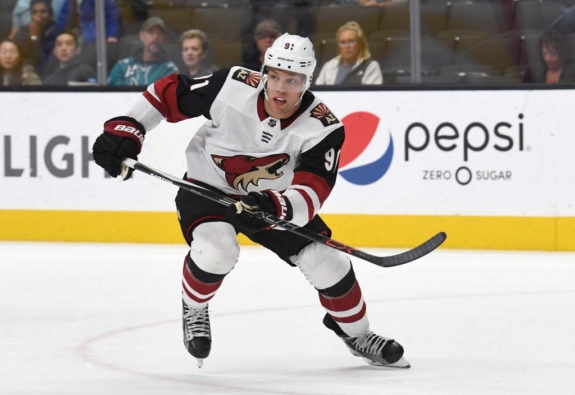
Speaking of difference-makers, in our preview of the Nashville series, I wrote that the Coyotes, who, on paper, were weaker than the Predators on the offensive end of the ice, potentially could swing the advantage back in their favor if Phil Kessel was able to rebound after a rough regular season.
Well, it looks like “Phil the Thrill” is back – he collected four points against Nashville while also firing 10 shots on net, tying for the team lead in both categories. It’s unlikely that the Coyotes would have advanced past the qualifiers without his production, and he’ll need to continue to produce going forward.

Aside from Kessel’s resurgence, Arizona also got unexpected contributions from Michael Grabner, Derek Stepan, and Brad Richardson, who scored the clincher in Game 4 while winning 58.8 percent of his faceoffs in the series. Clayton Keller was also a factor, collecting four points in the qualifiers after a relatively down regular season.
Scoring was a problem all season for the Coyotes, but, despite the small sample size, it looks like things may be moving in the right direction for both the top- and bottom-six forward groups. Still, with all that said, it’s clear that Colorado will be the better offensive team in this series. Their top line is going to get on the scoreboard – that’s a given. The Coyotes will need to counter with contributions from their own top guys while keeping the Avs’ bottom-six off of the scoreboard to have a chance here.
Advantage: Colorado
Defense
As was the case in the Nashville series with Roman Josi, the opposition will have the best defenseman on the ice here. Colorado’s rookie standout Cale Makar likely would have been a Norris Trophy candidate this season had he not missed 13 games due to injury, as he posted 50 points in 57 contests. His 0.88 P/GP was the third-best in the league and was better than guys like Victor Hedman, Dougie Hamilton, and Erik Karlsson. It’s pretty apparent that he’s on his way to superstardom in the NHL.
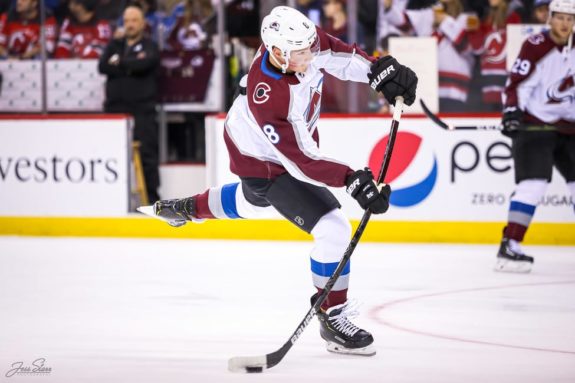
Behind Makar, the Avalanche boast solid depth in Sam Girard, Ryan Graves, Erik Johnson, Ian Cole, and Nikita Zadorov, with Mark Barberio on the bench as the seventh defenseman. Girard, like Makar, is one of the NHL’s best young defensemen. The 22-year-old, who posted 34 points in 2019-20, already has three full NHL seasons under his belt and has steadily improved in each of them. Graves, meanwhile, led the NHL in plus/minus this season and was on the ice for just 37 even-strength goals against. Every regular Colorado D-man had a positive plus/minus this season, even Barberio, who played just 21 games.
For Arizona, they’re led on defense by a resurgent Oliver Ekman-Larsson, who, after a below-average regular season, was a dominant player against Nashville. The captain recorded four points and a plus-three rating while playing 22:58 per game in the Coyotes’ four-game victory over the Predators. “OEL” has always been capable of being a top defenseman in the NHL, but since his back-to-back 20-goal seasons in 2014-15 and 2015-16, he hasn’t showcased those abilities very often. It looks like that has changed in the playoffs, though.

Ekman-Larsson is backed up on the top pair by veteran Alex Goligoski, while Jakob Chychrun, Jason Demers, Jordan Oesterle, and three-time Stanley Cup champion Niklas Hjalmarsson round out the second and third pairings. Oesterle’s play in the qualifiers was a nice surprise – he receives the least amount of ice time of any of the six defensemen, but he scored a huge go-ahead goal in the third period of Game 4 and added an assist as well.
As was the case against Nashville, the Coyotes are weaker defensively on paper when compared to the Avs. Despite the talent deficiency, the ‘Yotes were able to succeed against the Predators because of their superior depth and proficiency in their own zone, but they will have no such luck against Colorado. The Avs allowed just four more goals than the Coyotes over the course of the 2019-20 season and they boast a well-rounded, balanced defense corps, with one of the NHL’s best young stars in Makar leading the way.
Advantage: Colorado
Goaltending
In net, Pavel Francouz and Philipp Grubauer split the goaltending duties during the regular season for the Avalanche, and it looks like they may do so in the playoffs as well. Both men appeared in the Western Conference round-robin – Francouz shut out the Dallas Stars, while Grubauer went 1-0-1 against the Vegas Golden Knights and St. Louis Blues, allowing 53 goals on 58 shots over 122 minutes of play.
In the regular season, Grubauer started 36 games to Francouz’s 31, but his counterpart had him beat when it came to save percentage and goals against average. Francouz posted a .923 SV% and a 2.41 GAA, while Grubauer finished with a .916 SV% and a 2.63 GAA.
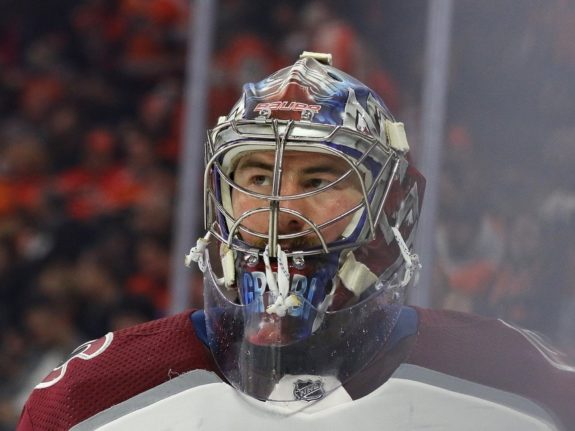
It’s anyone’s guess as to who will start for Colorado in Game 1, but Grubauer has the most experience of the pair, with 174 regular-season contests and 18 playoff games under his belt. On the other hand, Francouz has appeared in just 36 NHL contests, but boasts better numbers. We’ll have to see if head coach Jared Bednar chooses the veteran Grubauer, or the promising but inexperienced Francouz.
For Arizona’s Rick Tocchet, there will be no such decisions to be made. The Coyotes will ride Darcy Kuemper as far as he takes them. The 30-year-old was the Vezina Trophy frontrunner before going down with an injury in December, and, in the playoffs, it looks as if he’s picked up right where he left. Despite facing an average of 40.8 shots per game, Kuemper carried the Coyotes to a series victory in the qualifiers with a .933 SV% and 2.77 GAA.
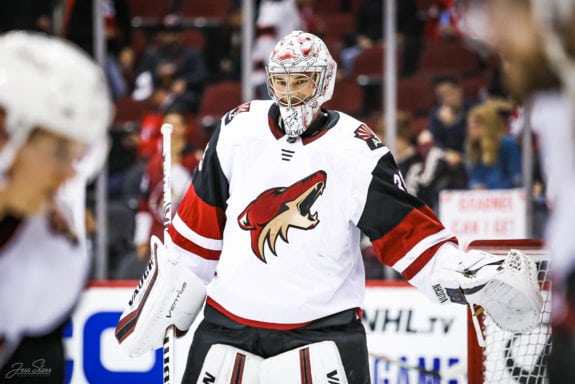
Backing up Kuemper are Antti Raanta and Adin Hill. Raanta was deemed unfit to play in the Nashville series after taking a puck to the head during warmups of Game 2 on Aug. 4, and it looks like he won’t be ready to return to action as the backup in Game 1 against Colorado. If that’s indeed the case, Hill will continue as the backup netminder.
There’s no reason to assume either of them will get a start in this series, though – it’s Kuemper’s net until further notice. He arguably is the hottest goaltender in the Western Conference right now, so there’s no way he’s coming out of the lineup. The ‘Yotes probably shouldn’t count on their goaltender to make 40 (or 50) saves per game, but Kuemper has proved he’s up to the task.
They say goaltending is the great equalizer in hockey, and the Coyotes will have the best goalie on the ice in this one. Kuemper gives Arizona a chance against any team they play against.
Advantage: Arizona
Special Teams
Despite all of the offensive talent present on the ice at any given time, the Avalanche didn’t have a great power-play unit in 2019-20. They actually finished behind Arizona in this area, scoring on 19.1 percent of their opportunities, good for 19th in the league. The Coyotes had the 18th-best power-play unit, at 19.2 percent. It would behoove Rick Tocchet’s group to not give MacKinnon, Landeskog, and Rantanen extra time on ice together, so they’ll need to stay out of the box as much as possible, but we’ll chalk the power-play units up as a draw.
When considering the penalty-kill units, Arizona holds an advantage over Colorado. The ‘Yotes had the fifth-best PK in the league this year, at 82.7 percent. In 2018-19, they led the league in this area, so Arizona has a proven penalty-kill system at the moment. For Colorado, they finished at 81.4 percent, which was 13th-best in the NHL.

Both teams are adept at scoring shorthanded goals – over the past two seasons, the ‘Yotes have the second-most “shorties” with 21, while Colorado has the ninth-most with 17. Michael Grabner already has a shorthanded goal for Arizona in these playoffs, so the Avalanche cannot afford to be careless with the puck when he’s on the ice killing penalties.
With these teams being relatively even on the power play, we’ll give the Coyotes the edge here because of their advantage on the PK.
Advantage: Arizona
Final Thoughts
Overall, this series is shaping up to be a tough one for the Coyotes. They were able to get by against Nashville by using a physical style of play to slow down the Preds’ top offensive weapons, but the group of MacKinnon, Landeskog, Rantanen, Burakovsky, Kadri, and Makar will be significantly more difficult to overcome. Arizona will have to once again rely upon their veteran group of defensemen and a Vezina-worthy goaltender in order to have a chance against an Avalanche team that looks every bit the part of a serious Stanley Cup contender.
Series Schedule (all times MST)
- Game 1: Wednesday, Aug. 12 – 2:30 P.M.
- Game 2: Friday, Aug. 14 – 11:00 A.M.
- Game 3: Saturday, Aug. 15 – 12:00 P.M.
- Game 4: Monday, August 17 – 2:30 P.M.
- Game 5: Wednesday, Aug. 19 – TBD*
- Game 6: Friday, Aug. 21 – TBD*
- Game 7: Sunday, Aug. 23 – TBD*
*if necessary